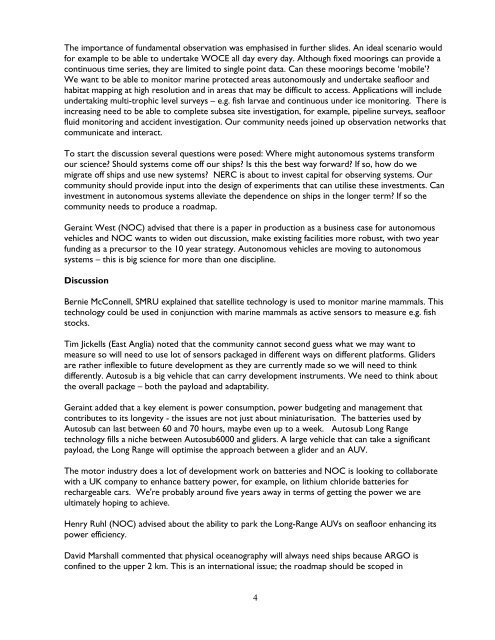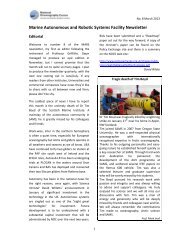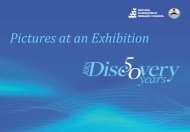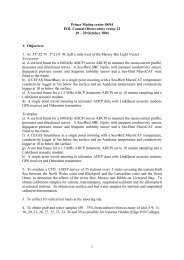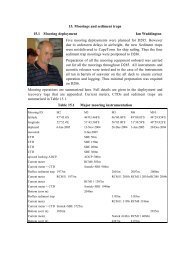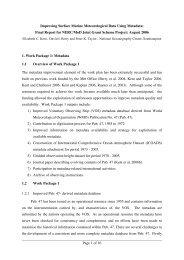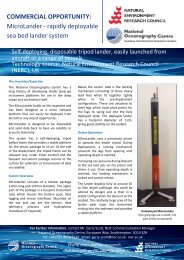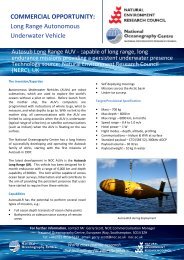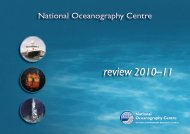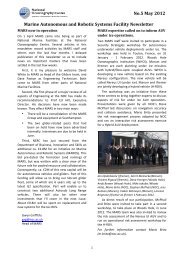Meeting Notes - National Oceanography Centre
Meeting Notes - National Oceanography Centre
Meeting Notes - National Oceanography Centre
Create successful ePaper yourself
Turn your PDF publications into a flip-book with our unique Google optimized e-Paper software.
The importance of fundamental observation was emphasised in further slides. An ideal scenario would<br />
for example to be able to undertake WOCE all day every day. Although fixed moorings can provide a<br />
continuous time series, they are limited to single point data. Can these moorings become ‘mobile’<br />
We want to be able to monitor marine protected areas autonomously and undertake seafloor and<br />
habitat mapping at high resolution and in areas that may be difficult to access. Applications will include<br />
undertaking multi-trophic level surveys – e.g. fish larvae and continuous under ice monitoring. There is<br />
increasing need to be able to complete subsea site investigation, for example, pipeline surveys, seafloor<br />
fluid monitoring and accident investigation. Our community needs joined up observation networks that<br />
communicate and interact.<br />
To start the discussion several questions were posed: Where might autonomous systems transform<br />
our science Should systems come off our ships Is this the best way forward If so, how do we<br />
migrate off ships and use new systems NERC is about to invest capital for observing systems. Our<br />
community should provide input into the design of experiments that can utilise these investments. Can<br />
investment in autonomous systems alleviate the dependence on ships in the longer term If so the<br />
community needs to produce a roadmap.<br />
Geraint West (NOC) advised that there is a paper in production as a business case for autonomous<br />
vehicles and NOC wants to widen out discussion, make existing facilities more robust, with two year<br />
funding as a precursor to the 10 year strategy. Autonomous vehicles are moving to autonomous<br />
systems – this is big science for more than one discipline.<br />
Discussion<br />
Bernie McConnell, SMRU explained that satellite technology is used to monitor marine mammals. This<br />
technology could be used in conjunction with marine mammals as active sensors to measure e.g. fish<br />
stocks.<br />
Tim Jickells (East Anglia) noted that the community cannot second guess what we may want to<br />
measure so will need to use lot of sensors packaged in different ways on different platforms. Gliders<br />
are rather inflexible to future development as they are currently made so we will need to think<br />
differently. Autosub is a big vehicle that can carry development instruments. We need to think about<br />
the overall package – both the payload and adaptability.<br />
Geraint added that a key element is power consumption, power budgeting and management that<br />
contributes to its longevity - the issues are not just about miniaturisation. The batteries used by<br />
Autosub can last between 60 and 70 hours, maybe even up to a week. Autosub Long Range<br />
technology fills a niche between Autosub6000 and gliders. A large vehicle that can take a significant<br />
payload, the Long Range will optimise the approach between a glider and an AUV.<br />
The motor industry does a lot of development work on batteries and NOC is looking to collaborate<br />
with a UK company to enhance battery power, for example, on lithium chloride batteries for<br />
rechargeable cars. We're probably around five years away in terms of getting the power we are<br />
ultimately hoping to achieve.<br />
Henry Ruhl (NOC) advised about the ability to park the Long-Range AUVs on seafloor enhancing its<br />
power efficiency.<br />
David Marshall commented that physical oceanography will always need ships because ARGO is<br />
confined to the upper 2 km. This is an international issue; the roadmap should be scoped in<br />
4


